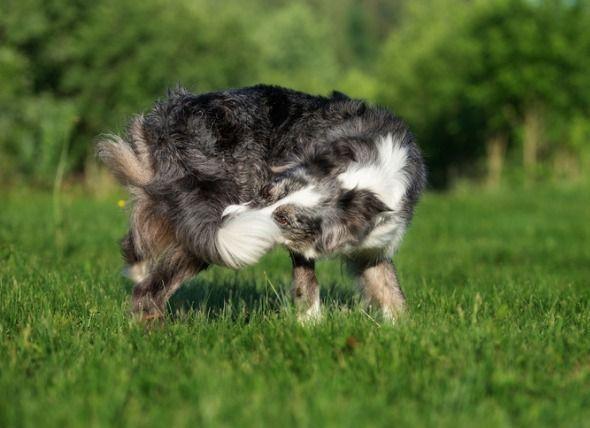My Dog Keeps Chasing Their Tail



See files for Dogs
Running around in circles or even chasing their tail is not abnormal behavior in dogs. It is often a healthy expression of their canine nature. Like all dog behaviors, if the behavior becomes compulsive or it is accompanied by signs of distress or discomfort, it may be a symptom of a problem. Various physiological or psychological issues can lead to a dog chasing their tail compulsively. Some of them can be treated with behavioral training, but others will need diagnosis and treatment administration by a veterinarian.
At AnimalWised, we look at why my dog keeps chasing their tail. We find out the reason they spin round on themselves, walk in circles and chase their tail so you can know what treatment may provide a solution to these problems.
My dog chases their tail and bites it
As stated in the introduction, a dog chasing their tail is not always a sign of a problem. When dogs are playing or exploring, they will often run around in excitement. This is a simple expression of joy, especially in younger dogs when they meet a potential playmate. When they are chasing themselves in a circle, the dog will not be in distress, but be showing obvious signs of happiness.
It is only when a dog chases their tail compulsively and/or violently that a problem has arisen. This is especially so when a dog chases their tail and bites it hard. If we see the dog is inflicting pain on themselves, it is more than simple play or exploratory behavior. In these cases, it is vital we determine the cause of the dog chasing and biting their tail:
Psychological causes
A stereotypy is a behavior which involves a repetitive movement or action without any obvious purpose. Since the action does not make sense in any context, we can usually determine the dog is doing it due to a psychological issue. When the behavior is sufficiently prolonged, it can cause the dog harm. For example, if a dog licks their paws, it will keep them clean. A dog licking their paws repetitively can cause the skin to break.
When a dog keeps chasing and biting their tail, it can cause them serious harm. This is especially so if they break the skin and the wound becomes infected. Stereotypies in dogs are more common in domestic animals and are often related to maladaption or maltreatment issues.
If a dog has been rescued from abandonment, they may feel emotional pain from the trauma they have experienced. In these cases, the dog chases and bites their tail to relieve emotional distress. For dogs which are being mistreated by their guardians, whether purposefully or not, it can lead to similar feelings. The tail chasing and biting behavior is due to anxiety, frustration and stress, all of which can have various causes.
Physiological causes
Dogs have various ways to reaching different parts of their bodies. This will depend on their morphology, especially since there is such morphological difference between different dog breeds. Some dogs can reach down to their back area by bending over, others may need to go round the side or even look like they are chasing their tail.
If a dog has any sort of agitation or lesion on their tail area, they may chase their tail and bite it to relieve the frustration they can cause. For example, a dog may chase their tail due to:
- Anal gland impaction
- Cuts or wounds to the rear
- Intestinal parasites
- External parasites
- Trauma
- Allergic dermatitis
Especially with issues such as parasites and allergic dermatitis in dogs, the tail area can become itchy or even painful for the dog. In these cases, it is normal for the dog to want to relieve the sensation. If these issues are not treated, the sustained agitation can lead the dog to cause serious damage to themselves, especially if wounds become infected.
For all these reasons, it is very important you take a dog which keeps chasing their tail to the veterinarian. They can either rule out or diagnose a physiological condition. If this is treated, the problem should resolve itself. If not, they will help to assess the psychological reason for the dog's behavior and may even refer you to an ethologist or dog trainer who will be best able to determine the cause of your dog's stereotypies.

My dog chases their tail and falls
There are times when it may seem like your dog is chasing their tail, but they are doing so awkwardly or even losing their balance. In these cases, the dog may be chasing their tail to stabilize themselves or because they are struggling to move properly.
Various causes and lead to a dog having such incoordination. Some of them are more serious or permanent than others. For example, a dog's balance is greatly influenced by their ears. If the animal has a problem such as canine otitis (ear inflammation), they may lean to the side or need to stabilize themselves. This usually resolves itself once the infection which causes the inflammation is treated.
Other factors may affect their balance and cause the dog to chase their tail and fall over. Different types of ataxia in dogs can affect their nervous system and result in incoordination. The treatment of ataxia will depend on the underlying cause. Other types of vestibular disease in dogs can also affect their balance, especially middle-aged and senior dogs.
If your dog is walking in circles, chasing their tail and losing coordination, you need to go to a veterinarian. They can diagnose the specific problem and provide the right treatment. Leaving it late can make certain problems irreversible.
My older dog keeps chasing their tail
As you can see, if your dog keeps chasing their tail, we need to look at the context of this behavior. In cases with younger dogs or puppies, it is possible we are witnessing a developmental issue. If a puppy has a genetic predisposition toward certain physical or neurological problems, we can see they may develop abnormal behaviors. Chasing their tail or incoordination may be one of them.
Similarly, older dogs chasing their tail might be related to their age. As a dog ages, their body may deteriorate due to the impact of time. Physically it shouldn't cause them to chase their tail, but cognitive dysfunction can occur. Dogs of any age can suffer from neurological disorders, but older dogs are particularly prone. They may not be able to control their behaviors and chase their tail as a result.
Cognitive dysfunction is a progressive problem in dogs. Although it cannot be cured, if we diagnose and manage the symptoms as soon as we see them develop, we may be able to give them a good quality of life during their remaining days. This is another reason it is so vital we take a dog to a veterinarian when we see they won't stop chasing their tail.

Other reasons why a dog keeps chasing their tail
We have explained some of the most common reasons why a dog chases their tail. While the following are not all as common, we should also consider the possibility of the following:
- Trauma to the brain
- Intracranial tumors
- Hydrocephalus
- Poisoning
- Reactions to certain medications
A visit to the vet is mandatory when we see this behavior. Only a specialist can determine what is happening to the dog and start the most appropriate treatment. A dog that goes around in a circle without stopping, falls, cries or panting is not normal, especially if it is an adult or elderly dog. It is important to investigate the cause of this behavior.

This article is purely informative. AnimalWised does not have the authority to prescribe any veterinary treatment or create a diagnosis. We invite you to take your pet to the veterinarian if they are suffering from any condition or pain.
If you want to read similar articles to My Dog Keeps Chasing Their Tail, we recommend you visit our Other health problems category.
- Carlson and Giffin. (2002). Practical manual of canine veterinary medicine . Madrid. El Drac.
- Diaz, M. G. Compulsive disorders in dogs and cats Ateuves Magazine, 58, 22-24.
- Morris, D. (1988). Watch your dog. Barcelona. Plaza and Janes.
- Signes, M. (2011). Stereotypies in the Canis familiaris. Veterinary Portal.







